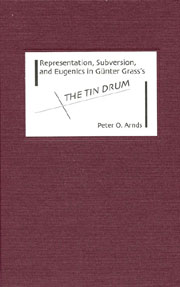Book contents
- Frontmatter
- Contents
- Acknowledgments
- Abbreviations
- Introduction
- 1 Representing Euthanasia; Reclaiming Popular Culture
- 2 Heteroglossia from Grimmelshausen to the Grimm Brothers
- 3 The Dwarf and Nazi Body Politics
- 4 Oskar's Dysfunctional Family and Gender Politics
- 5 Oskar as Fool, Harlequin, and Trickster, and the Politics of Sanity
- 6 Gypsies, the Picaresque Novel, and the Politics of Social Integration
- Epilogue: Beyond Die Blechtrommel: Germans as Victims in Im Krebsgang
- Works Cited
- Index
- Frontmatter
- Contents
- Acknowledgments
- Abbreviations
- Introduction
- 1 Representing Euthanasia; Reclaiming Popular Culture
- 2 Heteroglossia from Grimmelshausen to the Grimm Brothers
- 3 The Dwarf and Nazi Body Politics
- 4 Oskar's Dysfunctional Family and Gender Politics
- 5 Oskar as Fool, Harlequin, and Trickster, and the Politics of Sanity
- 6 Gypsies, the Picaresque Novel, and the Politics of Social Integration
- Epilogue: Beyond Die Blechtrommel: Germans as Victims in Im Krebsgang
- Works Cited
- Index
Summary
In German literature there are two texts in which the telling and remembrance of history is accomplished by the use of a drum. One is Heinrich Heine's Ideen: Das Buch Le Grand (Ideas: The Book Le Grand, 1826), the other, Nobel Laureate Günter Grass's Die Blechtrommel (The Tin Drum, 1959). While the drum of Heine's tambour-major Le Grand conveys the spirit of the French revolution and announces Napoleon, Grass's Oskar Matzerath evokes German history in the making and drums for the remembrance of this history. A further connection between these two texts is established through Napoleon's famous words quoted by Heine — “du sublime au ridicule il n'y a qu'un pas” (from the sublime to the ridiculous is only one step) — words that Napoleon uttered upon his return from Russia where almost his entire army of about 600,000 had just been defeated by the Russian winter and the Cossacks.1 These words have a special significance for Grass's novel. Heine's narrator describes how Aristophanes offers us the most terrible images of human madness through comedy, how Goethe expresses the greatest pain by means of a puppet play, and how Shakespeare puts the deadliest lamentation about the misery of the world into the mouth of a fool. Grass, as this study will demonstrate, approaches the representation of the horror of the Nazi crimes through various aspects of popular culture, and through the spirit of the carnival.
- Type
- Chapter
- Information
- Publisher: Boydell & BrewerPrint publication year: 2004

